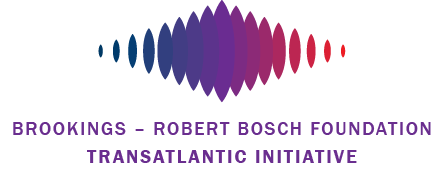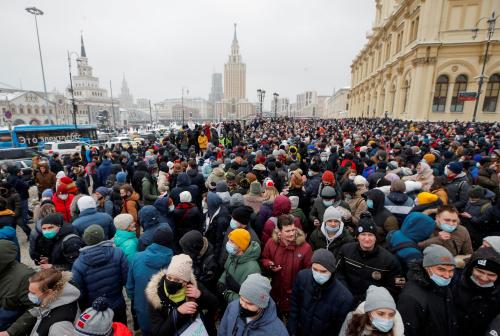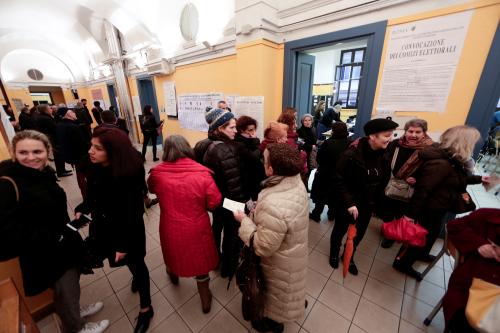

9:00 am EDT - 10:30 am EDT
Past Event
On September 27, as part of the Brookings – Robert Bosch Foundation Transatlantic Initiative (BBTI), the Center on the United States and Europe (CUSE) at Brookings hosted an expert panel discussion to dissect Germany’s federal election results and discuss its implications for German politics and policy. Moderated by Rieke Havertz, U.S. correspondent for ZEIT ONLINE, the panel featured Isabelle Borucki, interim professor at the University of Siegen; Yascha Mounk, associate professor at the Johns Hopkins School of Advanced International Studies; Daniela Schwarzer, executive director for Europe and Eurasia at the Open Society Foundations; and Constanze Stelzenmüller, CUSE senior fellow and Fritz Stern Chair on Germany and trans-Atlantic Relations at Brookings.
Havertz began by asking the panel to share what they considered the biggest surprise or upset from the September 26 election. Borucki noted how close the results of the top two parties were — with Olaf Scholz’s Social Democratic Party (SPD) at 25.7 percent, only narrowly outperforming Armin Laschet’s Christian Democratic Union (CDU), which received 24.1 percent. These numbers, she said, marked “the beginning of a new era of party systems and party politics.” For Mounk, while “there weren’t any major upsets” from recent polls, two broader developments did come as unexpected: the expectation that the SPD would likely win the chancellery and the fact that support for the far-right Alternative for Germany (AfD) declined. Schwarzer agreed, adding that the relatively low turnout for radical parties compared to 2017 — for the AfD as much as the Left Party — was a positive surprise. Stelzenmüller pointed to the still-stark divide between eastern and western Germany over 30 years after reunification.
The conversation then shifted to the issue of coalition negotiations, the next step toward government formation. Of particular note, the panelists agreed, was the power held in the process by the Greens and the Free Democrats (FDP), with the two likeliest coalitions involving the Greens, FDP, and SPD (a so-called “traffic light” coalition, named after the colors of the parties) under a Chancellor Scholz, or the Greens, FDP, and CDU (a “Jamaica” coalition) under a Chancellor Laschet. While Stelzenmüller outlined motivations for the two smaller parties to pursue the option with the CDU, she ultimately agreed with Mounk that the Christian Democrats would do well to go into opposition “to renew themselves.” As she later noted, “the CDU do not have a mandate,” and “Armin Laschet’s performance has been too poor.” But it is not only party leaders who would dictate coalition negotiations. Each party’s Bundestag members and electoral base, too, would play a pivotal role. Borucki emphasized the levels of dissatisfaction among certain party bases with party leadership.
Havertz next homed in on the possible climate and foreign policies of the next government, asking why the Green party had failed to gain more traction among voters despite high aspirations and the ever-growing threat of climate change. Stelzenmüller and Borucki pointed out that other parties highlighted the importance of finding climate-based solutions that are socially viable (SPD) or connected to innovation and technology (FDP). Such solutions, according to Mounk, avoid reference to the level of suffering to which climate change will inevitably lead, a prominent talking point of the Greens. On foreign policy, Schwarzer pointed to the urgent need for Berlin to position itself clearly on foreign and security issues in advance of Germany’s G-7 presidency and the French presidential elections in 2022, as well as in the wake of the U.S. withdrawal from Afghanistan and AUKUS deal.
Audience questions picked up on the issue of geopolitics, inquiring about implications of the election for German-China relations. Schwarzer said change would not be quick, but that Germany now possesses much better means of risk assessment. She added that with a traffic light coalition, a stronger line might be pursued on human rights. Finally, independent of the makeup of the incoming government, China’s influence in the EU’s direct neighborhood would be placed under greater scrutiny, in Germany as in Europe.
In closing, Havertz asked the panelists to predict Germany’s future governing coalition. All four agreed on a traffic light government, with Olaf Scholz at the helm. What does this portend for Angela Merkel? According to Stelzenmüller, an international position or future in politics is quite unlikely — instead, the chancellor’s longing for “walks and plum cakes” might finally become reality.
In Partnership With

9:00 am - 9:05 am
9:05 am - 10:30 am
Panelist



Fiona Hill
June 1, 2024

Constanze Stelzenmüller
February 9, 2021

Constanze Stelzenmüller
March 8, 2018